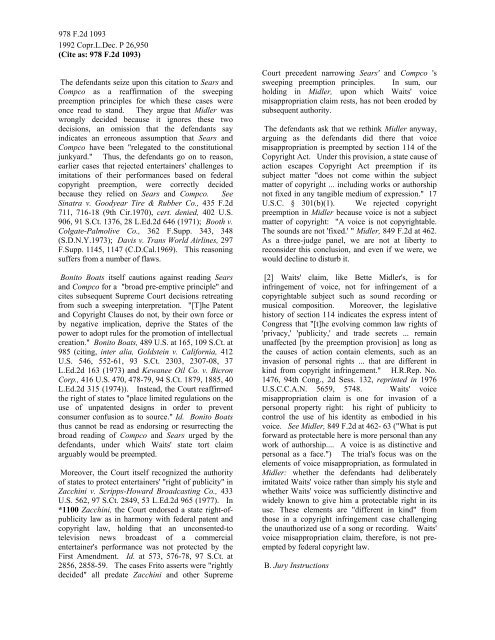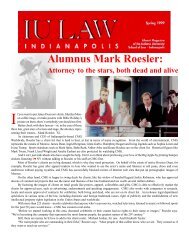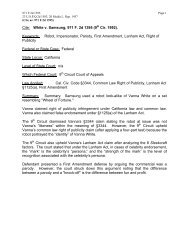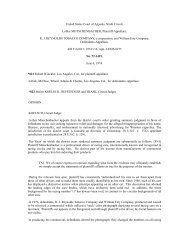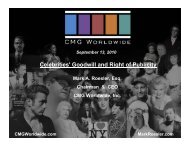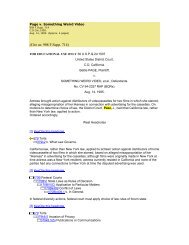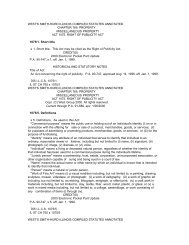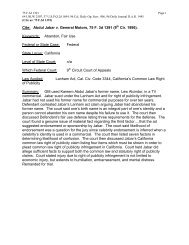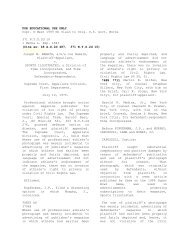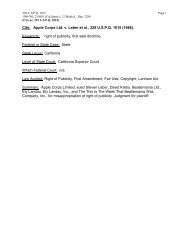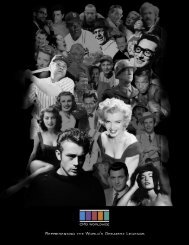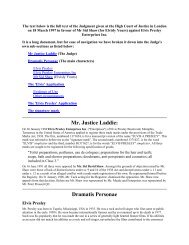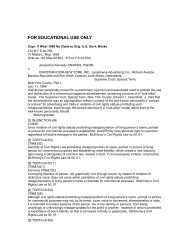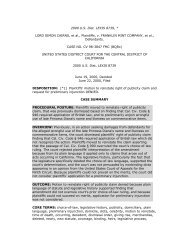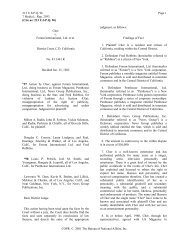Cite: Waits v. Frito Lay, 978 F. 2d 1093 (9th Cir. 1992 ... - Mark Roesler
Cite: Waits v. Frito Lay, 978 F. 2d 1093 (9th Cir. 1992 ... - Mark Roesler
Cite: Waits v. Frito Lay, 978 F. 2d 1093 (9th Cir. 1992 ... - Mark Roesler
You also want an ePaper? Increase the reach of your titles
YUMPU automatically turns print PDFs into web optimized ePapers that Google loves.
<strong>978</strong> F.<strong>2d</strong> <strong>1093</strong><br />
<strong>1992</strong> Copr.L.Dec. P 26,950<br />
(<strong>Cite</strong> as: <strong>978</strong> F.<strong>2d</strong> <strong>1093</strong>)<br />
The defendants seize upon this citation to Sears and<br />
Compco as a reaffirmation of the sweeping<br />
preemption principles for which these cases were<br />
once read to stand. They argue that Midler was<br />
wrongly decided because it ignores these two<br />
decisions, an omission that the defendants say<br />
indicates an erroneous assumption that Sears and<br />
Compco have been "relegated to the constitutional<br />
junkyard." Thus, the defendants go on to reason,<br />
earlier cases that rejected entertainers' challenges to<br />
imitations of their performances based on federal<br />
copyright preemption, were correctly decided<br />
because they relied on Sears and Compco. See<br />
Sinatra v. Goodyear Tire & Rubber Co., 435 F.<strong>2d</strong><br />
711, 716-18 (<strong>9th</strong> <strong>Cir</strong>.1970), cert. denied, 402 U.S.<br />
906, 91 S.Ct. 1376, 28 L.Ed.<strong>2d</strong> 646 (1971); Booth v.<br />
Colgate-Palmolive Co., 362 F.Supp. 343, 348<br />
(S.D.N.Y.1973); Davis v. Trans World Airlines, 297<br />
F.Supp. 1145, 1147 (C.D.Cal.1969). This reasoning<br />
suffers from a number of flaws.<br />
Bonito Boats itself cautions against reading Sears<br />
and Compco for a "broad pre-emptive principle" and<br />
cites subsequent Supreme Court decisions retreating<br />
from such a sweeping interpretation. "[T]he Patent<br />
and Copyright Clauses do not, by their own force or<br />
by negative implication, deprive the States of the<br />
power to adopt rules for the promotion of intellectual<br />
creation." Bonito Boats, 489 U.S. at 165, 109 S.Ct. at<br />
985 (citing, inter alia, Goldstein v. California, 412<br />
U.S. 546, 552-61, 93 S.Ct. 2303, 2307-08, 37<br />
L.Ed.<strong>2d</strong> 163 (1973) and Kewanee Oil Co. v. Bicron<br />
Corp., 416 U.S. 470, 478-79, 94 S.Ct. 1879, 1885, 40<br />
L.Ed.<strong>2d</strong> 315 (1974)). Instead, the Court reaffirmed<br />
the right of states to "place limited regulations on the<br />
use of unpatented designs in order to prevent<br />
consumer confusion as to source." Id. Bonito Boats<br />
thus cannot be read as endorsing or resurrecting the<br />
broad reading of Compco and Sears urged by the<br />
defendants, under which <strong>Waits</strong>' state tort claim<br />
arguably would be preempted.<br />
Moreover, the Court itself recognized the authority<br />
of states to protect entertainers' "right of publicity" in<br />
Zacchini v. Scripps-Howard Broadcasting Co., 433<br />
U.S. 562, 97 S.Ct. 2849, 53 L.Ed.<strong>2d</strong> 965 (1977). In<br />
*1100 Zacchini, the Court endorsed a state right-ofpublicity<br />
law as in harmony with federal patent and<br />
copyright law, holding that an unconsented-to<br />
television news broadcast of a commercial<br />
entertainer's performance was not protected by the<br />
First Amendment. Id. at 573, 576-78, 97 S.Ct. at<br />
2856, 2858-59. The cases <strong>Frito</strong> asserts were "rightly<br />
decided" all predate Zacchini and other Supreme<br />
Court precedent narrowing Sears' and Compco 's<br />
sweeping preemption principles. In sum, our<br />
holding in Midler, upon which <strong>Waits</strong>' voice<br />
misappropriation claim rests, has not been eroded by<br />
subsequent authority.<br />
The defendants ask that we rethink Midler anyway,<br />
arguing as the defendants did there that voice<br />
misappropriation is preempted by section 114 of the<br />
Copyright Act. Under this provision, a state cause of<br />
action escapes Copyright Act preemption if its<br />
subject matter "does not come within the subject<br />
matter of copyright ... including works or authorship<br />
not fixed in any tangible medium of expression." 17<br />
U.S.C. § 301(b)(1). We rejected copyright<br />
preemption in Midler because voice is not a subject<br />
matter of copyright: "A voice is not copyrightable.<br />
The sounds are not 'fixed.' " Midler, 849 F.<strong>2d</strong> at 462.<br />
As a three-judge panel, we are not at liberty to<br />
reconsider this conclusion, and even if we were, we<br />
would decline to disturb it.<br />
[2] <strong>Waits</strong>' claim, like Bette Midler's, is for<br />
infringement of voice, not for infringement of a<br />
copyrightable subject such as sound recording or<br />
musical composition. Moreover, the legislative<br />
history of section 114 indicates the express intent of<br />
Congress that "[t]he evolving common law rights of<br />
'privacy,' 'publicity,' and trade secrets ... remain<br />
unaffected [by the preemption provision] as long as<br />
the causes of action contain elements, such as an<br />
invasion of personal rights ... that are different in<br />
kind from copyright infringement." H.R.Rep. No.<br />
1476, 94th Cong., <strong>2d</strong> Sess. 132, reprinted in 1976<br />
U.S.C.C.A.N. 5659, 5748. <strong>Waits</strong>' voice<br />
misappropriation claim is one for invasion of a<br />
personal property right: his right of publicity to<br />
control the use of his identity as embodied in his<br />
voice. See Midler, 849 F.<strong>2d</strong> at 462- 63 ("What is put<br />
forward as protectable here is more personal than any<br />
work of authorship.... A voice is as distinctive and<br />
personal as a face.") The trial's focus was on the<br />
elements of voice misappropriation, as formulated in<br />
Midler: whether the defendants had deliberately<br />
imitated <strong>Waits</strong>' voice rather than simply his style and<br />
whether <strong>Waits</strong>' voice was sufficiently distinctive and<br />
widely known to give him a protectable right in its<br />
use. These elements are "different in kind" from<br />
those in a copyright infringement case challenging<br />
the unauthorized use of a song or recording. <strong>Waits</strong>'<br />
voice misappropriation claim, therefore, is not preempted<br />
by federal copyright law.<br />
B. Jury Instructions


